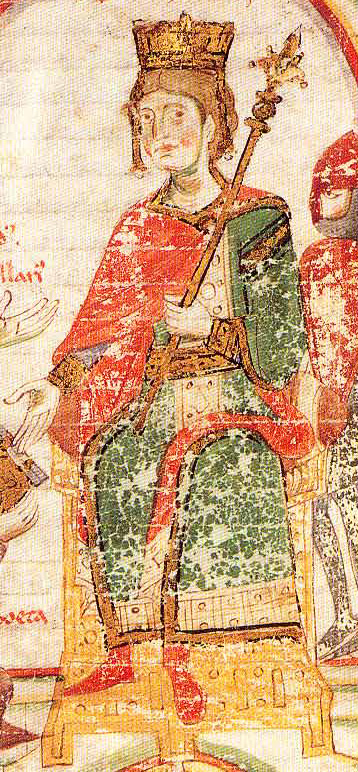
Henry VI, Holy Roman Emperor
Henry VI (German: Heinrich VI.; November 1165 – 28 September 1197), a member of the Hohenstaufen dynasty, was King of Germany (King of the Romans) from 1169 and Holy Roman Emperor from 1191 until his death. From 1194 he was also King of Sicily.
Henry VI
15 April 1191 – 28 September 1197
15 April 1191, Rome
15 August 1169 – 28 September 1197
15 August 1169, Aachen
Frederick I
Philip and Otto IV
21 January 1186 – 28 September 1197
21 January 1186, Milan
Frederick I
Otto IV
25 December 1194 – 28 September 1197
25 December 1194, Palermo
Constance
November 1165
Nimwegen, Holy Roman Empire
28 September 1197 (aged 31)
Messina, Kingdom of Sicily
Henry was the second son of Emperor Frederick Barbarossa and Beatrice I, Countess of Burgundy. Well educated in the Latin language, as well as Roman and canon law, Henry was also a patron of poets and a skilled poet himself. In 1186 he was married to Constance of Sicily, the posthumous daughter of the Norman king Roger II of Sicily. Henry, stuck in the Hohenstaufen conflict with the House of Welf until 1194, had to enforce the inheritance claims by his wife against her nephew Count Tancred of Lecce. Henry's attempt to conquer the Kingdom of Sicily failed at the siege of Naples in 1191 due to an epidemic, with Empress Constance captured. Based on an enormous ransom for the release and submission of King Richard I of England, he conquered Sicily in 1194; however, the intended unification with the Holy Roman Empire ultimately failed due to the opposition of the Papacy. In Sicily, Henry had a reputation for ruthless suppression of political opponents.[1] Until this day, he is sometimes given the nickname "the Cruel" (il crudele) by Italian historiography.[2][3]
Henry threatened to invade the Byzantine Empire after 1194 and succeeded in extracting a ransom, the Alamanikon, from Emperor Alexios III Angelos in return for cancelling the invasion. He made the Kingdom of Cyprus and the Armenian Kingdom of Cilicia formal subjects of the empire and compelled Tunis and Tripolitania to pay tribute to him. In 1195 and 1196, he attempted to turn the Holy Roman Empire from an elective to a hereditary monarchy, the so-called Erbreichsplan, but met strong resistance from the prince-electors. Henry pledged to go on crusade in 1195 and began preparations. A revolt in Sicily was crushed in 1197. The Crusaders set sail for the Holy Land that same year but Henry died of illness at Messina on 28 September 1197 before he could join them. His death plunged the Empire into the chaos of the German throne dispute for the next 17 years.
Biography[edit]
Early life[edit]
Henry was born in autumn 1165 at the Valkhof pfalz of Nijmegen to Emperor Frederick Barbarossa and Beatrice I, Countess of Burgundy. At the age of four his father had him elected King of the Romans during a Hoftag in Bamberg at Pentecost 1169. Henry was crowned on 15 August at Aachen Cathedral.[4][5]
Henry accompanied his father on his Italian campaign of 1174–76 against the Lombard League, whereby he was educated by Godfrey of Viterbo and associated with minnesingers like Friedrich von Hausen, Bligger von Steinach and Bernger von Horheim. Henry was fluent in Latin and, according to the chronicler Alberic of Trois-Fontaines, was "distinguished by gifts of knowledge, wreathed in flowers of eloquence, and learned in canon and Roman law". He was a patron of poets and poetry, and he almost certainly composed the song Kaiser Heinrich, now among the Weingarten Song Manuscripts. According to his rank and with Imperial Eagle (Reichsadler), regalia, and a scroll, he is the first and foremost to be portrayed in the famous Codex Manesse, a 14th-century songbook manuscript featuring 140 reputed poets; at least three poems are attributed to a young and romantically minded Henry VI. In one of those he describes a romance that makes him forget all his earthly power, and neither riches nor royal dignity can outweigh his yearning for that lady (ê ich mich ir verzige, ich verzige mich ê der krône – before I give her up, I'd rather give up the crown).